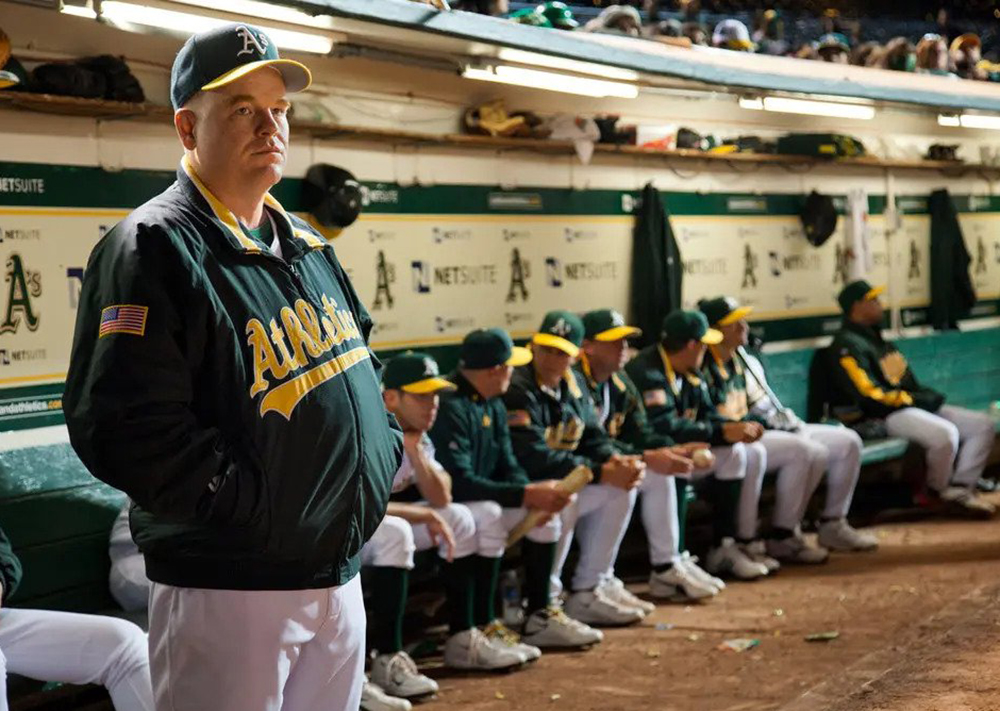Sports pictures usually have a common theme: some manner of overcoming enormous odds. And while some (particularly boxing films like “Rocky” and “Cinderella Man”) transcend their scope and become about more than sports, others flirt with the human element such as Kevin Costner’s timeless “Field of Dreams.” With this in mind—especially approaching MLB’s ‘All Star’ festivities taking place this week—taking another look at the Brad Pitt/Jonah Hill 2011 vehicle “Moneyball” brings us unlikely considerations. Based on a true story, the film is not dramatic, yet is not boring. It’s the story of a general manager who tries something different with a struggling team and changes the sport. And while Director Bennett Miller’s story isn’t your usual take on things, there’s no arguing the film is one of the most authentic sports movies ever made.
Brad Pitt plays Billy Beane, General Manager of the Oakland Athletics who was once a Major League contender but washed out. This is important. Since Beane would go on to challenge the status quo of scouting and how baseball teams were put together, it’s apropos his own talents—which didn’t pan out—were once misinterpreted by scouts. But what makes Beane work as a character is though his actions are divisive, he does’t intend to be. He wants to put a winning team together with a paltry budget and works super hard to do so.
Several things stick out that make “Moneyball” a hit. First, there’s the script and story by Aaron Sorkin, Steven Zaillian, and Stan Chervin, based off the book “Moneyball: The Art of Winning an Unfair Game” by Michael Lewis. The script is by-the-numbers and subtle. It lacks many of the prosaic trappings of Sorkin’s other works; it’s a look into a man’s personality and demons (Beane), and taking a scientific approach to a game ruled by intuition.
But that’s not the whole of it. The casting for the film is spot on, and so are the performances. What works best is the film’s characters are allowed transcend their roles, often by simply being themselves. Pitt is high-energy but relatable. One could argue he’s channeling “Ocean’s Eleven” here, but he’s really not. The same could be said of Jonah Hill. He speaks with that same quiet and self-deprecating humor that made roles in “Superbad” and “The 40 Year Old Virgin” hysterical, but transcends comedy to add heart to an economics expert who helps change the game.

The other players, from Philip Seymour Hoffman to Robin Wright to Chris Pratt aptly perform, keeping their performances close to their chest. “Moneyball,” for its $50M budget, feels like an independent film. I don’t know what that is if it’s not a compliment.
The skill of “Moneyball” is the film takes a concept and a massive cast, and by centering on just a few makes the film stick. Brad Pitt is in top form as Beane; his scenes with Hill, also in top form, make the movie’s moments stick. Pushback from professional scouts (many played by their real-life personalities) and Coach Art Howe (Hoffman) make up the film’s drama.
However, the picture is more than that; it immerses you in its happenings and makes you feel you’re part of this team. It also makes you believe. Beane starts with an idea and a resolve; there are so many times in the film were he’s pressured to drop that resolve, but he never does. The result of that resolve is a film that was nominated for six Oscars, and a GM that brings his team to the brink of success on a financial pittance.
“Moneyball” is a total picture that just works. It’s in the scenes. We see Beane do things that are hard but part of the job (several trades roll off his tongue easily; however, sending a player down to the Minors has a particular sting to it). It’s also in the way he encourages players like David Justice (Steven Bishop) to be a team player, and struggling 1st Baseman Scott Hatterberg (Chris Pratt) to believe in his own possibility. These same scenes are indicative of Beane’s own demons. Washing out years ago, he learns to believe in himself and have confidence. Interactions with his young daughter (a perfect Kerris Dorsey) further this along and are the meat of the movie, including a guitar song “The Show” written for the character and sung by Dorsey herself.
For all its big names and grand emotions, “Moneyball” feels like a small picture that welcomes you in. It rightly deserves its award nominations; and the film is so big and so robust, it takes several viewings to take it all in. A sports outsider myself, the film still found its way in, portraying its relevance and staying power. It’s a true sports film. It makes you understand the game, makes you feel its ups and downs, and, as Beane himself states, causes you to be romantic about the game despite the danger in being so. A solid picture all-in-all, “Moneyball” is a must-watch for the sports fan—and just about anyone else.
*”Moneyball” is currently available to watch on Hulu and Amazon Prime.